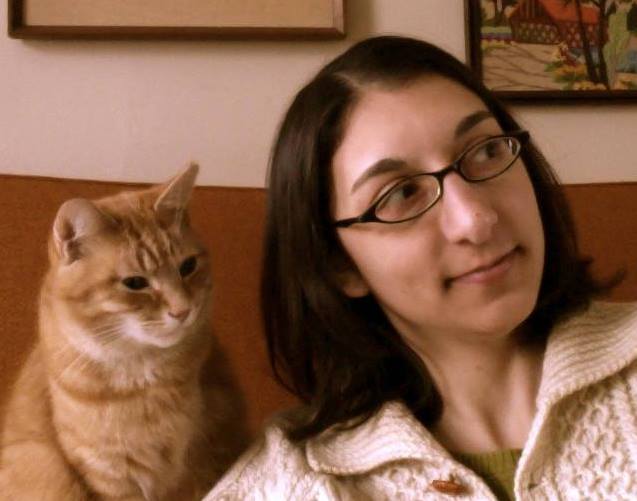
Today on the MAR blog, we’re bringing some words of wisdom (and more than a few words about cats and worms) from author and BGSU MFA alumna Tessa Mellas.
Tessa won the 2013 Iowa Short Fiction Award judged by Julie Orringer, and her debut story collection, Lungs Full of Noise, was published by the University of Iowa Press. She holds a BA from St. Lawrence University, an MFA from Bowling Green State University, and a PhD from the University of Cincinnati. In the spring of 2014, Tessa served as the Distinguished Visiting Writer at Bowling Green State University. Tessa grew up in Northern New York, is a former competitive synchronized figure skater, has been a vegetarian since the age of eight and is a recent vegan convert.
1. Let’s get this out in the open right away. It’s no secret that you have worms. Discuss.
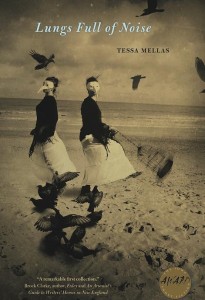 Ah yes, the worms. I have thousands of worms split between my worm inn at the house and my smaller worm domicile made of wood and recycled felt in my office at school. The worms are Red Wigglers, a European top-dwelling species that is great for vermicomposting because they are happy in just a few inches of bedding, consume half to all of their body weight in food waste per day, and produce the most fertile soil known to man. Their dung is called “Black Gold.” They’re really cool little critters. Some airports have worm facilities that process all of their food waste, diverting it from landfills. They can also neutralize toxins. It’s best not to feed them poison but they can consume poisonous substances and create a byproduct that is far less toxic. They are the lowest maintenance, lowest cost pet ever. Just feed them your vegetable and fruit scraps once a week, and they do their thing. And lest you think they’re not fun to hang out with, I spend hours rooting through their bedding (which is just paper and leaves, which they also eat). It is fascinating seeing all the different sized worms. The tiniest ones are like a tiny white hair of corncob silk that you can barely see but can find if you pick apart clods of vermicompost and look closely for movement. I love searching for their tiny brown lemon-shaped eggs, finding empty avocado peels stripped clean of meat with a fist-sized clump of pink worms burrowed inside the shell. At school, students bring my worms banana peels, apple cores, coffee grinds. The more they are fed, the more their colony grows and the more Black Gold I have for my houseplants and garden. Their compost has revived many a dying plant and produces monster plants in the garden. I could discuss worms all day, but likely we have literary things to talk about. Anyone want to talk worms? Just Facebook message me.
Ah yes, the worms. I have thousands of worms split between my worm inn at the house and my smaller worm domicile made of wood and recycled felt in my office at school. The worms are Red Wigglers, a European top-dwelling species that is great for vermicomposting because they are happy in just a few inches of bedding, consume half to all of their body weight in food waste per day, and produce the most fertile soil known to man. Their dung is called “Black Gold.” They’re really cool little critters. Some airports have worm facilities that process all of their food waste, diverting it from landfills. They can also neutralize toxins. It’s best not to feed them poison but they can consume poisonous substances and create a byproduct that is far less toxic. They are the lowest maintenance, lowest cost pet ever. Just feed them your vegetable and fruit scraps once a week, and they do their thing. And lest you think they’re not fun to hang out with, I spend hours rooting through their bedding (which is just paper and leaves, which they also eat). It is fascinating seeing all the different sized worms. The tiniest ones are like a tiny white hair of corncob silk that you can barely see but can find if you pick apart clods of vermicompost and look closely for movement. I love searching for their tiny brown lemon-shaped eggs, finding empty avocado peels stripped clean of meat with a fist-sized clump of pink worms burrowed inside the shell. At school, students bring my worms banana peels, apple cores, coffee grinds. The more they are fed, the more their colony grows and the more Black Gold I have for my houseplants and garden. Their compost has revived many a dying plant and produces monster plants in the garden. I could discuss worms all day, but likely we have literary things to talk about. Anyone want to talk worms? Just Facebook message me.
2. Once upon a time, you were an MFA student at BGSU and also worked on MAR. How did this time at Bowling Green influence your writing and your career today? Do you have any standout memories from your time editing MAR?
My MFA years at BGSU were such a lovely time. I was in my early twenties, and it was the first time in my life that I had a close-knit group of friends who loved books and who were engaged in the pursuit of becoming literary writers. In that regard, it felt like a homecoming or rather a finding of home. I learned volumes from my classmates’ writing and from browsing their bookshelves at house parties and chatting about writing projects at the bar. I learned so much from the MAR experience as well. Mike C. (the former editor of MAR) did an amazing job teaching us about the literary marketplace, of which I hadn’t a clue, and guiding us through the process by which manuscripts were selected. The experience of handling, critiquing, and discussing manuscripts for inclusion in the magazine seemed necessary in emboldening me to polish and submit my own work for publication. Fond memories of MAR include scavenger hunts and potluck copyediting parties. I always wanted to be the one to find a word misspelled, but I never did, only very minor comma infractions.
The MFA program at BGSU was also a game changer for me. One thing that BGSU does better than most of the other programs I’ve been acquainted with is that our professors taught us how to streamline our prose. We had a full-semester line-level workshop of only five students and our main goal was to take a finished story from each student and line-by-line make it more finished. I had never before and haven’t since had the educational experience of thinking so deeply about style at the sentence-level. Those lessons are always with me now as I write, revise, edit, and teach. I also found my sense of self as a writer. I entered the program writing realism and left a magical realist on the verge of further experimentation. I would recommend BGSU’s fiction program to anyone interested in a fully-financed MFA experience with a lot of personal attention, writing time, curricular flexibility, and a close-knit community of writers. It is a place where a budding magical realist can experiment and be supported and guided in that process.
3. How did your debut story collection, Lungs Full of Noise, come to be? How would you describe the publishing process and working with a small press?
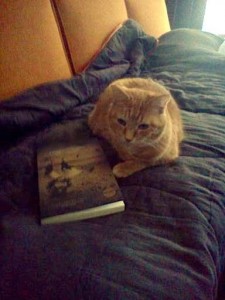 The stories in Lungs Full of Noise were written over a ten-year period: during the MFA, in the years when I was teaching composition full-time, and during my PhD program at the University of Cincinnati. I started thinking about the stories as a collection a year or two into the PhD program when I had to write about my work to try to procure summer funding and grant money. My efforts at describing the themes and style of my work as well as the canonical tradition into which it fit didn’t result in me “winning” money with which to write, but it did help me understand and hone the project and understand it as a book.
The stories in Lungs Full of Noise were written over a ten-year period: during the MFA, in the years when I was teaching composition full-time, and during my PhD program at the University of Cincinnati. I started thinking about the stories as a collection a year or two into the PhD program when I had to write about my work to try to procure summer funding and grant money. My efforts at describing the themes and style of my work as well as the canonical tradition into which it fit didn’t result in me “winning” money with which to write, but it did help me understand and hone the project and understand it as a book.
I got lucky, I think, with my route to publication. I had certainly worked and reworked the individual stories and felt confident in their quality, but I didn’t expect the book to get picked up in its first round of submissions. I feel sheepish admitting as much. I had a list of book contests I planned to submit to. I got the book out to just two contests and got the phone call from the University of Iowa Press. When they called, I didn’t even remember having submitted the manuscript. It had been six months, I think, and I asked the editor on the phone, “Serious?” My manuscript had the good fortune of being read by the right screeners and by the judge, Julie Orringer. I lucked out. And the experience in working with the University of Iowa Press was wonderful. They asked for suggestions on cover art and my favorite cover image, a beautiful photograph by Marta Orlowska, was chosen for the design. The design of the book is beautiful. My copyeditor was thorough and taught me things about grammar I didn’t realize I didn’t know. And the publicists were so helpful and thoughtful and caring. I feel like the University of Iowa Press is a family that has welcomed me in.
4. You’ve said that readers seem to respond most to the story “Bibi from Jupiter.” For those who haven’t read it, can you offer a brief synopsis and discuss why you think this story has such an impact on people?
Yes, “Bibi from Jupiter” is by far the fan favorite. The editors at Iowa wanted me to use “Bibi from Jupiter” for the title of the book but I reasoned one space alien does not a space alien book make. The story is about a college freshman who ends up rooming with a hermaphroditic Jupiterarian who’s doing stem cell research for her home planet. It is one of my earliest stories that survived the writing process. I wrote it during the MFA. I actually started it on the day of Aimee Bender’s visit to campus. It was a fun one to write. It is voice driven and filled with absurdity. I think readers respond to it because it is a fun romp through the self-absorbed insularity of college life. It is easy to both loathe and identify with the main character, Angela, who is judgmental to the point of bigotry without really knowing as much. And the story contains a healthy dose of alien sex, so that likely seals the deal. In online reviews, readers have suggested I turn Bibi into a novel. At readings, audience members have enquired into Bibi’s current whereabouts. I am intrigued by the interest. I don’t think Bibi will ever appear again on the page, though the voice is something I’m working with in a new project.
5. Now on to something more serious. You have cats. Tell me about them. Show them to me. CATS. How are they involved in the writing process?
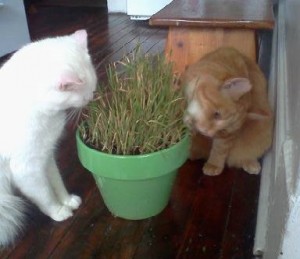 I have a privileged circle of friends that are into both writing and cats. It is a very special club. My cats rub their faces on the best books in the house and crawl behind the books and huddle in the sacred space between the ends of the books and the wall. Cats are certainly literary creatures of a strange type. They like rubbing their bodies on books and sitting on open books and listening to books.
I have a privileged circle of friends that are into both writing and cats. It is a very special club. My cats rub their faces on the best books in the house and crawl behind the books and huddle in the sacred space between the ends of the books and the wall. Cats are certainly literary creatures of a strange type. They like rubbing their bodies on books and sitting on open books and listening to books.
We have two cats. Their given names—given to them by a Cat Adoption Team—are Bianca (because she is fully white) and Tres (because he only has three legs). Bianca / Little Bonkers has two different colored eyes—one blue, one green—and she bites my nose in the morning when she is ready for me to wake her up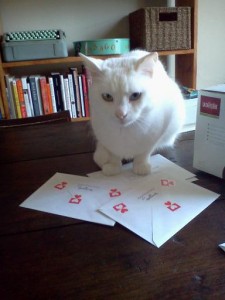 to feed her. She is otherwise a ferocious cuddle monster with a deep fear of bathtubs and a palate for moths. Tres, who we mostly call The Buddy Cat, is an orange tabby with handsome face stripes. Despite his three-leggedness, he is the dominant cat in the house. He has a deep love for all kinds of people food that you wouldn’t think would interest a cat—steamed broccoli, green peas, cream-of-wheat. I am vegan, and he begs me for these things and has been known to abscond with little broccoli trees.
to feed her. She is otherwise a ferocious cuddle monster with a deep fear of bathtubs and a palate for moths. Tres, who we mostly call The Buddy Cat, is an orange tabby with handsome face stripes. Despite his three-leggedness, he is the dominant cat in the house. He has a deep love for all kinds of people food that you wouldn’t think would interest a cat—steamed broccoli, green peas, cream-of-wheat. I am vegan, and he begs me for these things and has been known to abscond with little broccoli trees.
The cats keep me warm on late writing nights. They are true lap sitters—though it was a year of working up to this while they figured out whether or not we were worthy. It is nice having nonjudgmental company during the late or early writing hours. They listen courteously—I tend to read my writing out loud as I write—and nap as needed.
6. What’s on the horizon for your writing and for your career? Rumor has it that you’ve moved across the country for a new teaching job.
So I started a novel as every fiction writer must attempt at some point, like it or not. I am excited about the novel, but I put it away because it was intimidating the shit out of me. I think I bit off a research-heavy project that I wasn’t quite ready to handle—at least not while working the academic job market and moving across the country. I will go back to it.
Meanwhile, a flash piece that I had intended to put in my first collection but didn’t has turned into a flash series that I plan to turn into a novella-type-thing. The series is futuristic and magical and takes on issues of environmentalism and food scarcity. The prose style is somewhat experimental. I am using Matt Bell’s Cataclysm Baby, Tina May Hall’s All the Day’s Sad Stories, and Megan Martin’s Nevers as models for my project, though stylistically the book is probably closest to Bell’s work. I am one of those brooding writer types. Finding my way back to the pleasure of writing has been a long haul, but this project has gotten me there, finally and fully. I can’t say that I’m writing blissfully every day (I’m not sure I will ever be that type), but this is the first time I’ve had fun writing in a very long time. I hope that translates to readers.
And yes, rumor is correct. I moved this summer from Ohio to Maine. I was in Ohio for eleven years. I never expected to fall so deeply in love with Ohio, and a return is certainly not out of the question. Ohio has such a rich literary community and literary life, especially in the cities. I miss it and its writing folk deeply. But job security called, so I hit the academic job market and was fortunate to land a position at the University of Maine at Machias, a sustainability focused liberal arts school on the coast that seems to fit me perfectly. Machias and its neighboring communities are full of charm, personality, and natural beauty. I’m getting to teach a wide range of courses in subjects that interest me. On the slate for next semester is a literature course called Fabulous Women. I’m looking forward to the slower pace of life here and the space it is carving out for my writing.
7. Finally, what is your biggest piece of advice for 1) aspiring teachers of creative writing and 2) aspiring writers?
I had an epiphany this semester with my creative writing students, many of whom have pressing work and family obligations and were struggling to fit writing time into their schedules. I too was struggling to get in my hours with a 4-4 load and four preps. So we scheduled a writing slot, 2:00-3:00 every weekday. We meet in a lounge on campus. Often it is just two or three of us who come with our laptops, talk about our plan for the hour, and write in each other’s presence. It has been as many as seven writers. Other professors on campus have asked to join in. I would suggest this for any writing teacher. Students see you writing and hear about your process. You see them writing and hear about yours. It’s win-win. I wish I had done this during my Visiting Writer semester last spring in Bowling Green. But I’m glad I thought of it with still many years to go in my career. It takes full advantage of the community of creative writers in a university setting and makes us all more supportive and productive.
It’s so hard to give “aspiring writer” advice without hitting the old clichés. But here’s something I learned the hard way. First, a caveat, I do believe that writer’s block is real—not all writing profs do. Some helpful research I read describes writer’s block as a defense mechanism. When you become abusive to yourself as a writer and your internal dialogue tells you how horrible your writing is and thus how horrible you are as a writer and person, your body starts to shut down. Your brain will try to avoid writing because it is a painful place to be. Being kind to yourself as a writer without making excuses for why you can’t write is important. And what I have found to be most helpful is what I call “finding a back way into the writing.” So here’s how the metaphor goes. Writing is a house and there’s a happening party inside, but the front door (the way you usually write, sitting down at your computer, opening up a document, typing) is locked, and you have to find a different way into the house—a back door, an unlocked window, a sewage pipe. If the front door’s locked, that doesn’t mean there isn’t a different way to access the party that’s happening inside the writing house. I often trick my way into writing by writing by hand, by sketching, mapping, listing, modeling/mimicking. Those are my back ways into writing. Sometimes you have to outwit the abused writer’s brain and do writing in a way that doesn’t feel abusive until you get on a roll and the writing starts to feel good.
Thanks, Tessa!
Laura Maylene Walter, Fiction Editor
